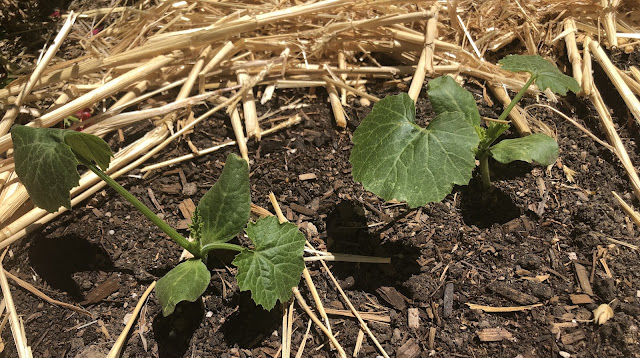
Warm days, nights will prompt rapid growth of summer vegetables

|
|
Straw is an excellent mulch for summer squash and other summer vegetables: It's light but helps prevent the soil from drying out. And that droopy leaf at left? That's a normal reaction to afternoon heat by squash, melons and tomato plants.
The time to worry (and water) is when they droop in early morning. (Photo: Kathy Morrison) |
Mid May will feel a lot like mid June as Sacramento settles into a pattern of warm, dry days with above-normal temperatures.
According to the National Weather Service, Sacramento will see three or four days in the low 90s this week with the remainder in the mid to high 80s. Overnight lows are warm, too, with some nights staying above 60. Historically in May, Sacramento averages highs of 80 degrees and lows of 51.
Those above-average nights mean soil temperature will be warming, too. Expect rapid growth from tomatoes, peppers, eggplant and squash as they soak up that early heat.
While that heat is good for summer crops, it likely will push remaining cool-season vegetables over the top. Harvest cabbage, lettuce, kale, broccoli, beets, carrots, chard, spinach and similar veggies before they go to seed. High temperatures also can turn lettuce and other leafy greens bitter. Pick them now and store in the refrigerator crisper drawer.
Those 90-degree days will crisp roses and other spring blooms. Take some time this week for clean up. Get chores done early to avoid afternoon sun.
* Deadheading – cutting off spent flowers – will extend bloom season for many shrubs, especially roses. Expect another round of roses six to eight weeks after deadheading re-blooming varieties.
* Keep an eye out for slugs, snails, earwigs and aphids that want to dine on tender new growth.
* Feed summer flowering shrubs and perennials with a balanced fertilizer.
* Are birds picking your fruit off trees before it’s ripe? Try hanging strips of aluminum foil on tree branches. The shiny, dangling strips help deter birds from making themselves at home.
* Run the sprinklers early in the day – before 8 a.m. if possible – to conserve water and minimize plant diseases.
* Mulch around trees and shrubs as well as plants in the vegetable garden. Mulch conserves moisture and cuts down on weeds.
* Transplant tomatoes, peppers and eggplants. Pinch off any flowers on new transplants to make them concentrate on establishing roots instead of setting premature fruit.
* Direct-seed melons, cucumbers, summer squash, corn, radishes, pumpkins and annual herbs such as basil.
* In the flower garden, direct-seed sunflowers, cosmos, salvia, zinnias, marigolds, celosia and asters.
* Transplant petunias, marigolds and perennial flowers such as astilbe, columbine, coneflowers, coreopsis, dahlias, rudbeckia and verbena.
* Don’t forget to water. Seedlings need moisture. Deep watering will help build strong roots and healthy plants.
Comments
0 comments have been posted.Sacramento Digs Gardening to your inbox.
Sites We Like
Garden Checklist for week of July 21
Your garden needs you!
* Keep your vegetable garden watered, mulched and weeded. Water before 8 a.m. to reduce the chance of fungal infection and to conserve moisture.
* Feed vegetable plants bone meal, rock phosphate or other fertilizers high in phosphate to stimulate more blooms and fruiting. (But wait until daily high temperatures drop out of the 100s.)
* Don’t let tomatoes wilt or dry out completely. Give tomatoes a deep watering two to three times a week.
* Harvest vegetables promptly to encourage plants to produce more. Squash especially tends to grow rapidly in hot weather. Keep an eye on zucchini.
* Pinch back chrysanthemums for bushy plants and more flowers in September.
* Remove spent flowers from roses, daylilies and other bloomers as they finish flowering.
* Pinch off blooms from basil so the plant will grow more leaves.
* Cut back lavender after flowering to promote a second bloom.
* It's not too late to add a splash of color. Plant petunias, snapdragons, zinnias and marigolds.
* From seed, plant corn, pumpkins, radishes, winter squash and sunflowers.